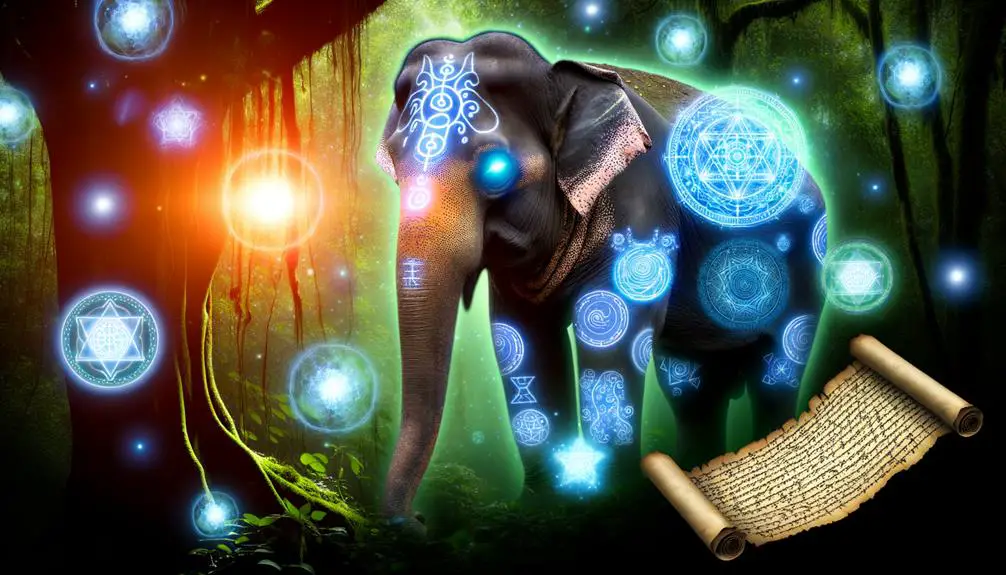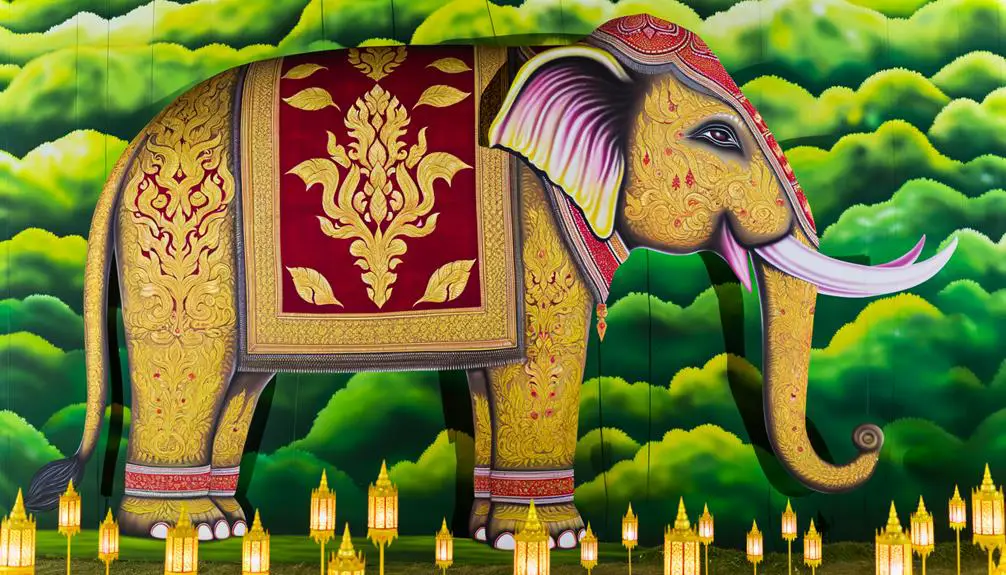Meaning of the Elephant Symbol in Different Cultures
The elephant symbol embodies a rich tapestry of meanings across cultures. It represents strength and power, evidenced by its sheer physical presence and social structures led by matriarchs.
Elephants are also seen as emblems of wisdom and intelligence, prevalent in traditions such as Hinduism with Ganesha, the deity who removes obstacles. Their slow, deliberate movements symbolize patience and endurance.
Additionally, they are considered bearers of good luck and fortune in many cultural contexts. African folklore further elevates these magnificent creatures as symbols of memory, leadership, and protection.
Exploring deeper, one uncovers a profound array of attributes associated with the elephant.

Key Takeaways
- Elephants symbolize strength and power due to their immense size and physical capabilities.
- They represent wisdom and knowledge, known for their intelligence and memory across various cultures.
- Elephants are seen as symbols of patience and endurance, embodying perseverance and deliberate movements.
- They are considered emblems of good luck and fortune, often associated with prosperity and positive energy.
- In African folklore, elephants are revered for their leadership, memory, strength, protection, and fertility.
Strength and Power

The elephant, revered across various cultures, epitomizes strength and power through its sheer size, formidable presence, and unwavering resilience.
This majestic creature can weigh up to 12,000 pounds, making it one of the largest terrestrial animals. Its physical prowess is complemented by its ability to traverse diverse terrains, from dense forests to arid savannas.
The elephant's strength is not merely physical; it also manifests in the animal's social structures. Herds are led by matriarchs whose leadership ensures survival and cohesion.
The elephant's capacity to uproot trees and break barriers further symbolizes its power. Consequently, the elephant has become a universal emblem of fortitude, often invoked in art, literature, and religious texts to signify unyielding strength and indomitable spirit.
Wisdom and Knowledge

Renowned for their remarkable intelligence and memory, elephants have long been symbols of wisdom and knowledge in various cultural and spiritual traditions. In Hinduism, the deity Ganesha, depicted with an elephant's head, is revered as the remover of obstacles and the patron of arts and sciences. This association underscores the elephant's role as an embodiment of intellectual prowess and enlightenment.
In African folklore, elephants are often portrayed as wise leaders, guiding their herds through challenging terrains and complex social structures. Scientific studies further validate these cultural views, revealing that elephants possess advanced problem-solving abilities and exhibit a profound capacity for empathy and social learning.
As a result, the elephant symbolizes a deep-seated reverence for intellectual and experiential knowledge across diverse cultures.
Patience and Endurance

In various cultural and spiritual traditions, elephants epitomize patience and endurance, reflecting their ability to navigate life's challenges with steadfast resilience. Renowned for their long lifespans and intricate social structures, elephants demonstrate remarkable fortitude in the face of adversity.
Their slow and deliberate movements symbolize a measured approach to life's trials, emphasizing the virtue of persistence. Scholarly interpretations often highlight elephants' capacity to endure both physical and emotional hardships, serving as a metaphor for human perseverance.
Historical texts and oral traditions frequently depict elephants as beings that embody a calm and composed demeanor, reinforcing the idea that true strength lies in patience. This symbolic representation encourages individuals to cultivate endurance and unwavering determination in their own lives.
Good Luck and Fortune

The elephant has long been regarded as an emblem of good luck and fortune across various cultures and historical periods. Its significance is not merely confined to ancient traditions but persists in contemporary interpretations, influencing modern decor and lifestyle choices.
This enduring symbolism invites a deeper examination of its historical roots, cultural variations, and present-day manifestations.
Historical Significance Globally
Throughout various cultures and historical periods, the elephant has been revered as a powerful emblem of good luck and fortune. This majestic creature has left an indelible mark on the spiritual and cultural landscapes of numerous societies. In Hinduism, elephants symbolize wisdom and protection, embodied by the deity Ganesha. In African cultures, the elephant often represents strength and sovereignty. Meanwhile, in Southeast Asia, these animals are seen as harbingers of prosperity and success.
| Culture | Symbolism | Historical Context |
|---|---|---|
| Hinduism | Wisdom, Luck | Ganesha, the remover of obstacles |
| African | Strength | Revered in tribal rituals and storytelling |
| Southeast Asia | Prosperity | Integral in royal ceremonies and folklore |
| Buddhism | Peace, Longevity | Buddha's white elephant, a sign of purity |
This diverse symbolism underscores the elephant's enduring influence across time and geography.
Cultural Interpretations Today
Across contemporary cultures, the elephant continues to be a potent symbol of good luck and prosperity, reflecting its deep-rooted significance in historical traditions. This majestic creature is imbued with a variety of positive attributes, which are celebrated and revered globally.
The following cultural interpretations underscore the elephant's ongoing relevance:
- Hinduism: Lord Ganesha, the elephant-headed deity, is invoked for removing obstacles and bestowing wisdom.
- Buddhism: Elephants symbolize mental strength and responsibility, epitomizing the Buddha's qualities.
- African Traditions: Elephants represent leadership, wisdom, and community solidarity.
- Chinese Culture: Associated with longevity and stability, often seen in Feng Shui practices.
- Western Beliefs: Elephants symbolize memory and intelligence, often included in motifs to attract good fortune.
These interpretations illustrate the elephant's multifaceted role in conveying prosperity and good luck across diverse cultures.
Symbol in Modern Decor
In modern decor, the elephant symbol is frequently incorporated as an emblem of good luck and fortune, reflecting its deep-seated cultural significance and aesthetic appeal. This trend can be observed in various design elements, ranging from intricate sculptures to minimalist wall art.
The elephant's symbolic association with wisdom, strength, and protection aligns seamlessly with contemporary ideals of well-being and prosperity. Additionally, its presence in interior spaces often serves as a focal point, fostering a sense of harmony and balance.
The enduring popularity of the elephant motif underscores a collective recognition of its positive virtues, making it a timeless addition to both traditional and modern decor. Consequently, the elephant symbol continues to resonate as a powerful icon of auspiciousness in today's design landscape.
Ganesha in Hinduism

Ganesha, the elephant-headed deity, holds a pivotal role in Hinduism as the remover of obstacles and the god of beginnings, wisdom, and intellect. His iconography is rich with symbolism that conveys deeper philosophical meanings.
Ganesha's large head signifies wisdom and understanding, while his small eyes indicate concentration and attention to detail. His trunk, adaptable and strong, represents efficiency and adaptability. The broken tusk symbolizes sacrifice and the importance of letting go of the past. His large ears denote an openness to new ideas and the ability to listen to others.
- Large head: Wisdom and understanding
- Small eyes: Concentration and attention to detail
- Trunk: Efficiency and adaptability
- Broken tusk: Sacrifice and letting go of the past
- Large ears: Openness and listening skills
Peace in Buddhism

The concept of peace in Buddhism is deeply intertwined with the practice of mindfulness and the cultivation of inner tranquility. Central to this pursuit is the idea of achieving a state of equanimity, where the mind remains undisturbed by external circumstances.
Buddhism emphasizes the importance of meditation as a tool to quiet the mind and foster a sense of profound peace. This inner peace is not merely the absence of conflict but the presence of a balanced and harmonious state of being.
Symbolically, the elephant in Buddhism represents both mental strength and serene composure. As practitioners cultivate mindfulness, they embody the elephant's qualities—steady, gentle, and unyielding—thus advancing toward true peace and enlightenment.
Elephants in African Folklore

While the elephant symbolizes mental strength and serene composure in Buddhism, its role in African folklore is equally profound, embodying themes of wisdom, power, and community.
Across various African cultures, the elephant is revered not only for its majestic presence but also for its symbolic significance. Elephants in African tales often represent:
- Leadership: Elephants are seen as natural leaders in many stories.
- Memory: Their reputed memory symbolizes the importance of history and tradition.
- Strength: Physical strength and resilience are common attributes.
- Protection: Elephants are protectors of their herds, symbolizing guardianship.
- Fertility: Their size and strength also relate to fertility and prosperity.
These multifaceted symbols highlight the elephant's integral role in embodying the values and virtues of African communities.
Conclusion
In examining the multifaceted symbolism of the elephant, one must marvel at humanity's penchant for attributing grandeur to pachyderms. From the emblematic strength and wisdom to the auspiciousness in various cultures, it is evident that elephants have been burdened with more than just their considerable mass.
Perhaps, in the quest for meaning, society finds solace in these sagacious giants, thereby elevating them to near-mythical status. Truly, the elephant stands as a tribute to human creativity and anthropomorphic fervor.






